
Choosing your content platform is one of the most foundational decisions your team will ever make. It’s a choice that ripples through your entire workflow, impacting everything from creative efficiency, collaboration, and scalability to site speed and, ultimately, your search engine rankings.
In one corner, you have the undisputed champion of the web, WordPress, the established, do-anything giant.
In the other, you have Ghost, the sleek, performance-focused challenger built specifically for professional publishers.
The debate is fierce, and the stakes are high. That’s why we’re moving beyond surface-level comparisons to provide a definitive Ghost vs. WordPress guide for marketers and SEOs. By the end, you will have the clarity to choose the right platform that not only fits your workflow but also actively accelerates your business goals.
| Feature | Ghost | WordPress |
|---|---|---|
| Best For | Writers, publishers, newsletters, and membership sites | Virtually any type of website, from blogs to e-commerce stores |
| Ease of Use | Very easy, with a clean and intuitive interface | Moderate learning curve due to its vast number of options |
| SEO Approach | Excellent SEO features are built-in from the start | Basic core SEO; relies on powerful third-party plugins |
| Monetization | Native, built-in tools for paid subscriptions and newsletters | Requires third-party plugins for memberships and monetization |
| True Cost Model | Predictable monthly/annual fee with managed hosting | Can start cheap, but costs grow with hosting and premium plugins |
| Flexibility | Focused and streamlined; less flexible by design | Infinitely flexible and customizable through themes and plugins |
Before we dive deep into the comparison, let’s quickly establish what these platforms are and clarify the most common point of confusion in the WordPress world.
Ghost is a modern, open-source publishing platform built on a technology called Node.js. It was launched in 2013 with a singular focus: creating the best possible platform for professional writers, journalists, and creators to build a sustainable business around their content.
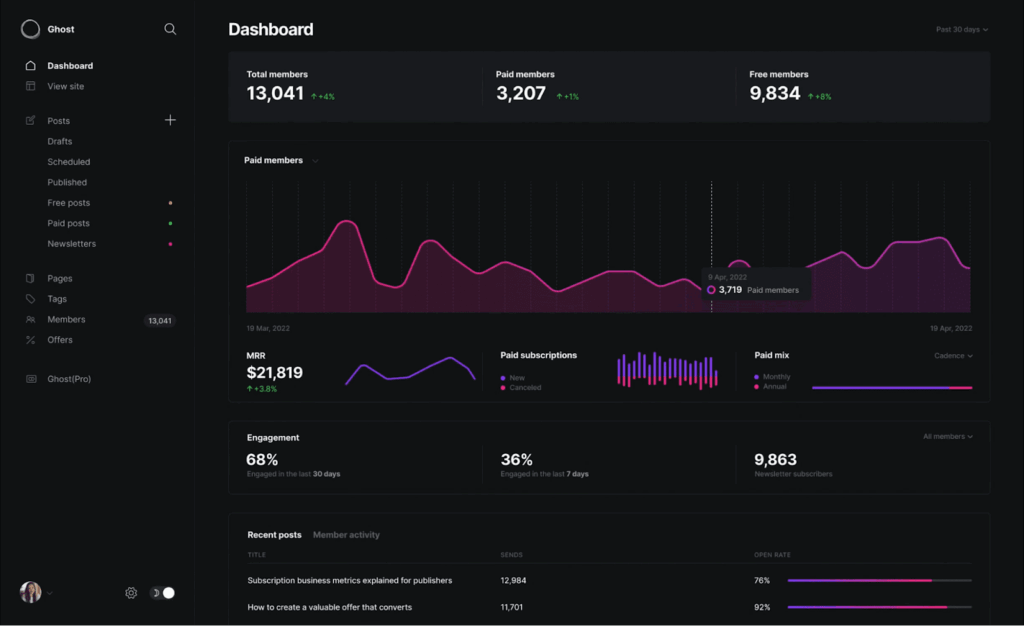
Ghost prioritizes a clean writing experience, incredible speed, and native tools for newsletters and paid memberships.
This is where many people get tripped up. WordPress isn’t just one thing; it comes in two distinct forms:
WordPress.org is the free, open-source content management system (CMS) software that anyone can download and install on their own web hosting account.

It gives you 100% control, freedom, and ownership. When people talk about the limitless power of WordPress, they are usually referring to this version.
Contrary to WordPress.org, WordPress.com is a for-profit company that uses the WordPress.org software and sells it as an all-in-one, hosted service. It currently ranks 14th and holds a 1.03% market share of the global web hosting market, according to HostAdvice, so it’s safe to say they know what they’re doing.
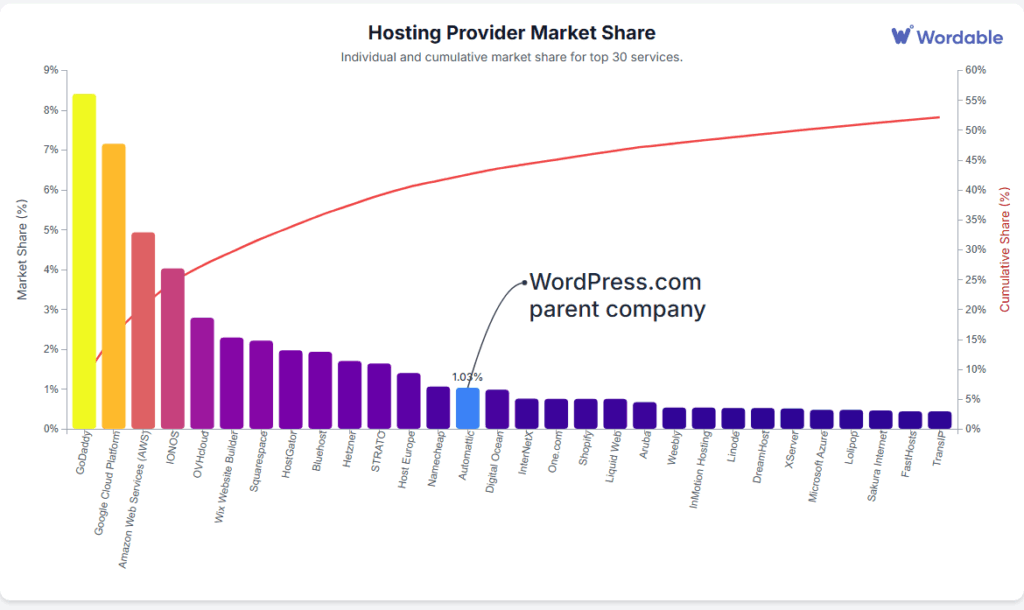
WordPress.com makes it easier to get started because the hosting and technical maintenance are handled for you, but it comes with limitations, especially on lower-tier plans.
For a fair comparison with Ghost’s managed hosting (Ghost Pro), we’ll primarily compare it to WordPress.com’s paid services, while also considering the popular self-hosted option.
Let’s begin with round one.
The first thing you’ll notice when comparing these two platforms isn’t a feature—it’s a feeling. How you create content is directly shaped by the core philosophy of the platform you choose. You’re not just picking a tool; you’re adopting a way of working.
| Feature | Ghost | WordPress |
|---|---|---|
| Primary Focus | Writing & publishing | Website building |
| Editor | Minimalist & fast (Koenig) | Powerful & versatile (Gutenberg) |
| Learning Curve | Low | Moderate |
Ghost was built with one person in mind: the writer.
Its dashboard is clean, uncluttered, and immediately intuitive. It strips away distractions so you can focus on getting words on the page. The entire experience is designed to keep you in a state of creative flow.
The centerpiece of this philosophy is the Koenig editor. It’s a beautiful, minimalist interface that feels more like writing on Medium than managing a complex CMS.
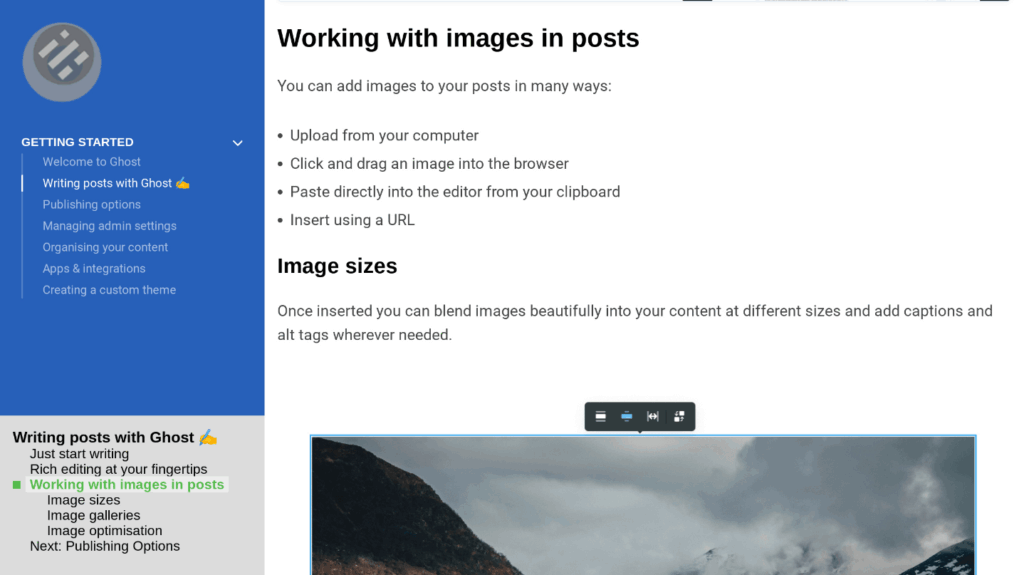
It also has rich, native support for Markdown, a simple text-formatting syntax that lets you add headings, links, and lists without ever taking your hands off the keyboard. This intentional simplicity makes content production faster, more enjoyable, and free of technical friction.
WordPress, on the other hand, gives you a powerful and versatile toolkit in the form of the Gutenberg block editor. Each piece of content, from a paragraph to an image gallery, is a movable “block.” This approach provides immense flexibility for building complex, media-rich layouts with columns, buttons, and custom embeds directly within your posts.
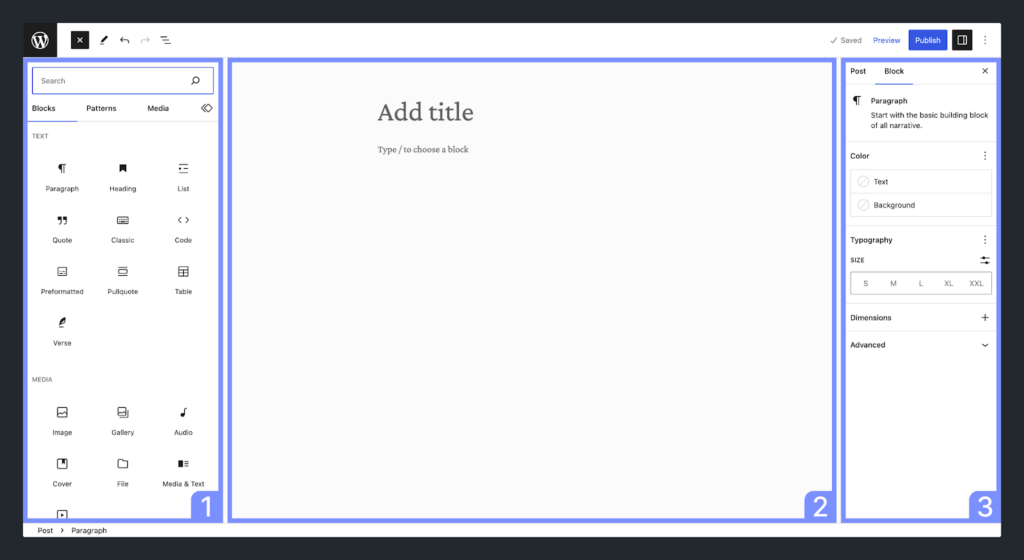
WordPress’s power and flexibility are why it remains the undisputed leader in the CMS market (more on that below).
However, this power comes with a steeper learning curve, and collaboration within the Gutenberg editor leaves much to be desired. That’s why many high-volume content teams that use WordPress still prefer to draft and collaborate within their Google Workspace, using Google Docs for its superior collaboration features. However, this workflow typically involves clunky copy-pasting that wreaks havoc on your paragraph formatting and font style.
Savvy publishers solve this using tools like Wordable, which allows one-click export of perfectly formatted Google Docs to WordPress, automating the content publishing workflow at scale.
For marketers and SEOs, this is the million-dollar question. A beautiful site is useless if no one can find it. Here, the two platforms take dramatically different approaches to search engine optimization.
| Feature | Ghost | WordPress |
|---|---|---|
| Core SEO | Excellent, built-in | Basic, requires plugins |
| Performance | Extremely fast by default | Variable, requires optimization |
| Advanced Control | Good, with some limits | Unmatched via plugins |
Ghost operates on the principle that excellent SEO should be built in, not bolted on.
Right out of the box, it handles the technical fundamentals that many WordPress sites need plugins to manage. This includes:
Ghost also automatically adds structured data (schema markup) to your posts, helping you earn rich snippets in search results. It also has built-in fields for metadata, social sharing cards, and more.
These features alone have proven to be enough to win many large publishers over, as Uri Bram told Ghost after adopting the platform for The Browser Newsletter:
“Ghost is just implausibly good. It takes care of everything you need out of the box.”
But its single biggest SEO advantage is speed.
Because Ghost is built on a modern Node.js tech stack, it’s incredibly lightweight and fast by default. This gives you a massive head start on Google’s Core Web Vitals, a crucial and often challenging ranking factor to optimize for.
WordPress’s core SEO features are minimal at best.
Its true power is unlocked through its incredible ecosystem of third-party plugins. Tools like Yoast SEO and Rank Math are industry standards for a reason. They offer a level of granular control that Ghost simply can’t match.

With a good SEO plugin, you can fine-tune every aspect of your on-page SEO, from advanced schema types for recipes or reviews to intricate redirect management and internal linking suggestions. You can also directly integrate with Google Search Console to monitor performance.
For teams that need to follow a strict WordPress SEO checklist, this level of control is non-negotiable. While it requires setup and configuration, the result is a powerful, customizable SEO machine.
Modern content marketing is increasingly about building a direct relationship with your audience and monetizing it. This is perhaps the clearest point of difference in the Ghost vs. WordPress debate.
| Feature | Ghost | WordPress |
|---|---|---|
| Memberships | Native, built-in | Requires plugins |
| Email Newsletters | Native, built-in | Requires plugins or a 3rd-party service |
| Setup Simplicity | Very High | Moderate to complex |
Ghost was rebuilt from the ground up to serve the creator economy.
Its strongest and most unique feature is its native membership and newsletter functionality. Without touching a single plugin, you can launch a full-featured membership site with free and paid subscription tiers.
Not only that, you can connect a Stripe account in minutes and start accepting payments, with Ghost taking 0% commission on your revenue. You can gate content for specific member tiers and even use the platform as your email service provider, sending posts directly to your audience’s inboxes as newsletters.
These features tap directly into the booming creator economy, a booming market that, according to Goldman Sachs, is projected to nearly double in size to $480 billion by 2027.

To replicate Ghost’s functionality on WordPress, you need to turn to its vast plugin library.
Powerful membership plugins like MemberPress, Restrict Content Pro, and Easy Digital Downloads can do everything Ghost can do and often much more. You can:
This modular approach offers incredible power and flexibility. However, it also introduces more complexity and cost.
This brings us to the final major comparison: the trade-off between a simple, all-in-one system and an endlessly extensible one. This choice directly impacts your site’s flexibility, scalability, and its true, long-term cost.
| Feature | Ghost | WordPress.org |
|---|---|---|
| Themes | High-quality, curated selection | Massive, endless options |
| Extensibility | Via API and official integrations | Via 60,000+ plugins |
| Pricing Model | Predictable all-in-one subscription | Low entry cost, variable total cost |
The difference in ecosystems is stark.
WordPress’s dominance is undeniable. It powers over 43% of all websites as of early 2025, according to W3Techs (though BuiltWith data puts the number closer to 25%, still 6X higher that the runner-up on that list). That’s 9X more than the runner-up, Shopify, and it’s only gained traction over the years.
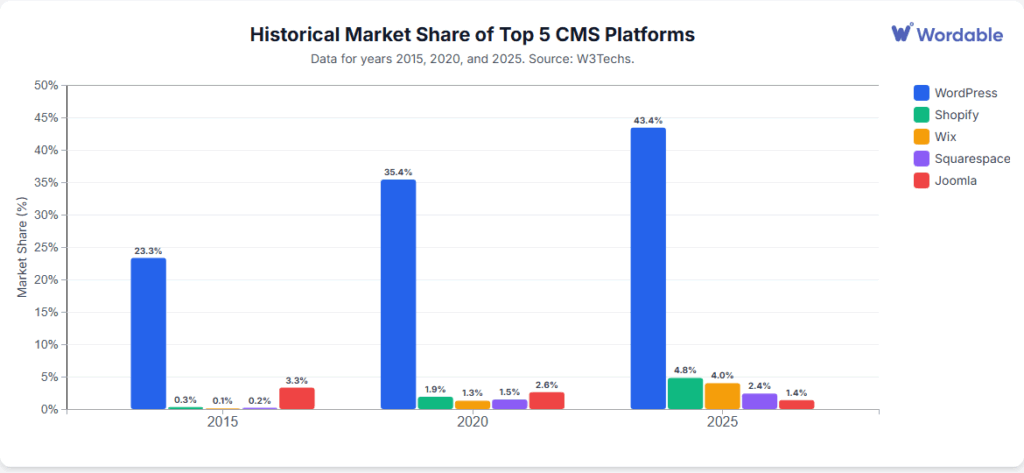
This massive user base supports an ecosystem of over 60,000 free plugins and countless premium themes, allowing you to find a tool for nearly any function you can imagine, from creating a numbered list to integrating complex order forms.
Ghost, in contrast, offers a curated and controlled ecosystem.
It doesn’t have traditional plugins. Instead, it favors a clean REST API and official integrations with key services like Zapier, Slack, and Google Analytics. This approach is less prone to the security vulnerabilities and performance bloat that can plague a plugin-heavy WordPress site, but it offers far less choice.
For teams that want to find and update broken links or add other specific functionality, Ghost may require a developer, whereas WordPress often has a plugin for it.
Your platform’s cost is more than just the sticker price; it’s about the total cost of ownership.
The primary difference lies in the service model. Ghost(Pro) and WordPress.com offer predictable, all-in-one subscription packages. In contrast, self-hosting with WordPress.org provides a low initial cost but involves variable expenses for hosting, premium themes, and plugins that can quickly add up.
The table below breaks down the true cost of each option.
| Feature | Ghost(Pro) | WordPress.com | Self-Hosted WordPress.org |
|---|---|---|---|
| Pricing Model | All-in-one subscription | Tiered subscription | A la carte (DIY) |
| Typical Starter Cost | ~$9–$29 per month | ~$4–$25 per month | ~$5–$15 per month (plus setup) |
| High-End Cost | ~$199+ per month | ~$45+ per month (Commerce/Enterprise) | ~$100–$500+ per month |
| Hosting & CDN | Included (Fully managed) | Included (Managed) | User’s responsibility & cost |
| Security & Updates | Included (Automatic) | Included (Automatic) | User’s responsibility & cost |
| Premium Plugins | N/A (Uses integrations) | Requires an expensive “Business” plan | Primary source of recurring costs |
| True Cost | Predictable and transparent. | Predictable, but gets pricey for full features. | Highly variable. Can become the most expensive option long-term. |
So, after all that, which platform should you choose? It comes down to your team’s priorities, technical comfort level, and ultimate goals.
You should choose Ghost if you are a writer, publisher, or content marketer who prioritizes speed, a beautiful writing experience, and wants built-in tools to launch a newsletter or membership site with minimal fuss. It’s the perfect choice for those who want the technology to get out of the way so they can focus purely on creating great content.
You should choose WordPress if you are a business, agency, or individual who needs a highly customized, infinitely scalable website and values a limitless selection of tools and design options above all else. If you can imagine it, you can probably build it with WordPress, provided you’re comfortable managing the technical overhead that comes with that freedom.
In the end, there is no single “best” platform. The endless Ghost vs. WordPress articles all point to the same truth: the best choice is the one that aligns with your team’s goals, skills, and business model.
Whether you’re looking for the focused publishing power of Ghost or the boundless creative freedom of WordPress, the right tool empowers you to connect with your audience.If you’ve decided the power and flexibility of WordPress is right for you, don’t let a clunky workflow slow you down. See how Wordable can save your content team two to four hours per week by automating your publishing process from Google Docs.